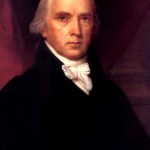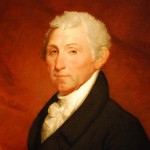The Problem of Intellectual Theft
What can a writer do when someone else takes his work without admitting it? That’s the question posed in a poignant and measured piece posted today by Richard Labunski at the History News Network.
In 2006, Labunski published James Madison and the Struggle for the Bill of Rights. As part of that book, he addressed the 1789 congressional campaign between Madison and James Monroe, the only time two future presidents squared off in an electoral contest. Madison was targeted in that campaign by those who opposed the new Constitution. To win his race and preserve his political career, Madison promised to press in the new Congress for a Bill of Rights, so the campaign was an important part of Labunski’s story.
Last year, Chris DeRose published Founding Rivals: Madison v. Monroe, the Bill of Rights, and the Election that Saved A Nation. After hearing DeRose claim on C-SPAN2 that no one had ever previously written the story of the Madison/Monroe contest, Labunski tracked down the newer book. Although Labunski is plainly persuaded that DeRose cribbed large parts of his book from Labunski’s without ever mentioning that earlier work, he focuses on a single practical point.
Labunski reports that he estimated the voter turnout in the election by going through landowning records for the eight Virginia counties and identifying the eligible voters. He then divided those totals into the actual votes cast. The resulting turnout percentages, he writes, never before appeared in print. Yet the DeRose book replicates all of those percentages at exactly the amounts determined by Labunski, again never mentioning Labunski’s book.
Labunski has attempted to get DeRose’s publisher, Regnery Press, to acknowledge publicly that the information was drawn from his book. To date, he has received no satisfaction, as he details in his post. I leave that narrative to him.
For me and many writers, though, this is a recurring concern. Labunski presents his case without obvious rancor or rage and wins a certain immediate credibility because his book was produced by Oxford University Press, while DeRose’s came from Regnery, a new publisher with an avowed purpose of promulgating politically conservative works.
Because I am working on a book on James Madison right now, I find this dispute fascinating. I have read both books at issue. DeRose’s, to be candid, is a slender volume that seemed to huff and puff very hard to coax a manuscript out of a congressional campaign about which we know relatively little. The contemporary sources about the election are very limited, and most of his book discusses subjects other than the campaign. I have put it aside, vaguely sorry I paid for it, and do not expect to look at it again. I suppose there should be a strong skepticism toward any book with a title that trumpets a heretofore unknown event as having “saved the nation.”
Labunski’s book is much more substantial. Though it was far meatier, it was not an easy read. Nevertheless, I expect to refer to it in my work (and duly cite it as a resource, as appropriate). And I regret greatly that DeRose himself has not come forward to address this issue squarely, instead of hiding behind evasive statements by his publisher.
All of us who write history do so with a certain dread in our hearts — the dread of making mistakes. We are human, and we will make mistakes. Readers have pointed out a couple of mistakes in my books, and after the requisite and soul-shriveling self-recrimination, I am glad to be able to correct them in a later edition. Perhaps DeRose simply made a mistake somehow. Without an explanation of this situation from him, though, the presumptions run against him.

